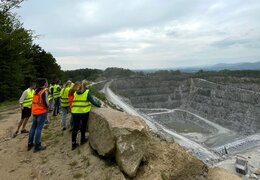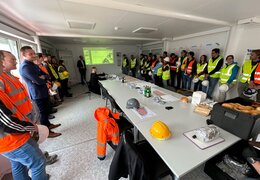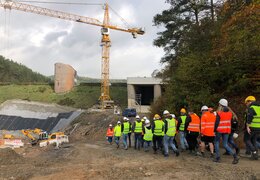Lukas Kainz
2025 | Environmental Engineering

Career Development
When I used to be asked what I would like to do for a living, my answer was usually that I would like to have a multifaceted job that fulfills and challenges me at the same time challenging - so that I can grow with new tasks.
For this reason, I informed myself at various trade fairs and on the Internet about possible career fields. I came across the new environmental engineering course. I found it particularly appealing that this degree program offers an exciting and future-oriented training that enables graduates to play an active role in solving engineering actively participate in solving engineering problems. I find it particularly exciting that the degree program offers the opportunity to gain valuable and practical knowledge in future-oriented areas such as waste management, water and wastewater technology and renewable energies. At the same time, the course also teaches important basics, for example in the mathematics module.
I also think it's helpful that the environmental engineering course is interdisciplinary. Especially in the first semesters, many modules overlap with other courses, such as civil and construction engineering, which makes it easier to exchange ideas outside of your own course. As I would like to deepen and expand my knowledge, I am continuing my Bachelor's degree with a Master's degree in Civil and Environmental Engineering.
Reminiscing allowed: remember your student days
For this reason, I decided to complete my Master's degree in Civil and Environmental Engineering also in Deggendorf in order to familiarize myself further with the various different areas and to deepen the knowledge I had already acquired.
The informal atmosphere within the faculty and the relatively small lecture groups offer a clear advantage: this makes it easier to get into conversation with lecturers and fellow students, to discuss topics or to address aspects that often don't find a place in large lectures.
The final excursion to the construction site of the Brenner Base Tunnel was a special experience that I always remember fondly and would not want to miss. The opportunity to go on an exciting, educational and entertaining excursion together with fellow students and lecturers shortly before completing my Bachelor's degree was breathtaking. This experience was also an additional motivational boost during the stressful phase of writing the Bachelor's thesis.
What advice would you give to today's students?
The Environmental Engineering degree course offers numerous facets that enable even undecided students to get to know different sub-areas. It can happen that a subject that was initially perceived rather negatively or neutrally ends up being a positive surprise.
There are some valuable tips for future students in Deggendorf to make their time at university successful and enjoyable. One particularly nice aspect is the close proximity to nature: the campus in Deggendorf is located directly on the Danube and borders the Donaupark, which invites you to sit and relax with your fellow students after long days of lectures in the summer.
Deggendorf also has a lot to offer in terms of sport: As the gateway to the Bavarian Forest, the region offers ideal conditions for hiking and cycling tours - even in mountainous terrain, where you are rewarded for every effort with impressive views from one of the many peaks. If you prefer more action, you can let off steam as a mountain biker in the Geißkopf Bike Park. For more relaxed tours, the flat landscape along the rivers is ideal for cycling or jogging. All of this not only helps to clear your head, but also offers a wonderful opportunity to enjoy nature to the full. Especially
recommended is the university sports club, which also gives you access to facilities such as the Elypso or the climbing hall. If you don't like being alone, you'll quickly find people to be active with.
It is also easy to make contacts at the Deggendorf campus. The advantage of the small faculty is that students and professors know each other well. Student groups and clubs offer a platform to meet like-minded people and make new friends.
It is also helpful to be open to practical experience during your studies. Deggendorf attaches great importance to practice-oriented training. The practical semester, for example offers the opportunity to apply theoretical knowledge in real projects. This not only provides valuable experience, but also contacts in the industry.
With these tips, you are well prepared to make your time studying in Deggendorf a successful and enjoyable one. Make sure you find a good work-life balance and allow yourself enough free time to get through stressful exam phases. And you should always be aware of one thing: If you don't understand something in a module or face other challenges in your studies, you are rarely alone. Talking to fellow students is often very helpful - learning together not only makes things easier, but also allows you to support and benefit from each other.














